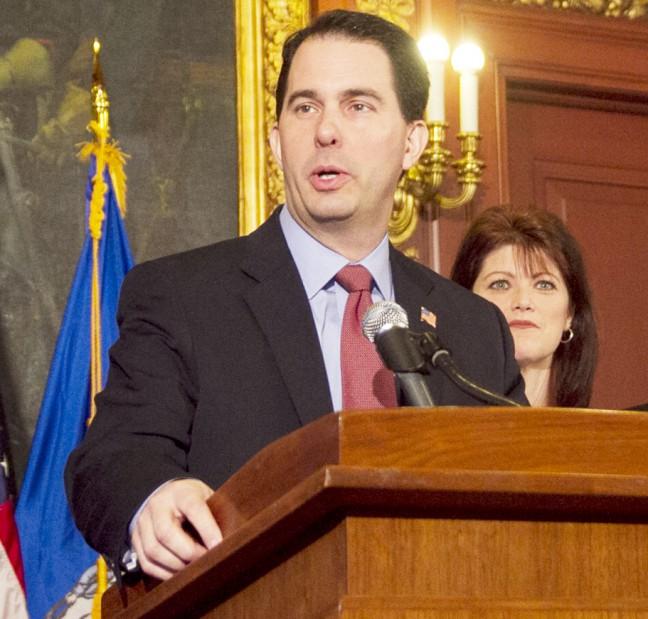Maybe he’s not ready for the spotlight. Gov. Scott Walker, current frontrunner of a kooky assemblage of potential Republican presidential candidates, hasn’t exhibited polished political savvy in recent months.
Aside from his raucous welcome in Iowa in January, Walker has swung and missed on occasion – and we’re talking fastballs, right down the middle.
Walker attempted to convince the public his recent battles against protesters would provide him with the know-how and pragmatism to take on the Islamic State. The logic, while a stretch, could be considered relatively reasonable to those on the right. However, for Walker to believe for one second the left would refrain from clobbering the comment is more naïve than a bright-eyed freshman searching for a house party in the Lakeshore neighborhood. It’d be like Hilary Clinton considering herself a suitable leader in the fight to eliminate ISIS by virtue of her uncanny ability to erase things – emails, public trust, etc.
For Walker, swinging and missing is one thing. What’s troubling is at times he won’t even take the swing. The governor declined to definitively answer whether President Barack Obama is a Christian or not. His lack of a simple, “Yes, I believe he is,” led quickly into a story that should not have been.
No, Walker has not always been sharp since stepping onto the national stage. He has survived, but now sits in a critical stage of his candidacy. He and his team are assuredly putting together a shield of responses before the presidential campaign truly commences. Every possible question and corresponding answer will be deciphered and processed, creating custom fit, bulletproof media armor. Unfortunately, even the strongest political armor is vulnerable to one thing: lies.
In a recent Jezebel article, or whatever you want to call this depressing attempt at journalism, writer Natasha Vargas-Cooper accused Walker of removing a section of legislation which required the reporting of sexual assaults on campus, implicitly pushing the assumption Walker has no sympathy for victims of sexual assault. Vargas-Cooper was not completely wrong; legislators did, in fact, delete sexual assault reporting language.
They did not do this, though, because they hate the law, or victims of sexual assault, women or people in general. They did so because it was redundant language, already present in a federal law governing University of Wisconsin.
Another senseless, deceptive Walker-bash arose in the form of Gail Collins’ New York Times opinion column. In her February article, Collins cited examples of the governor’s “war on public employee unions, particularly the ones for teachers.”
She brought up that one time in 2010 when Walker cut state education funding which caused teacher layoffs. But in reality, and contrary to Collins’ clear-cut narrative, Walker did not execute the cuts. He couldn’t have because he didn’t take office until 2011. A damn shame, really. Maybe if Collins wished a bit harder it could have been true.
These two journalistic gaffes floated around the web, but were eventually denounced like objectivity-scant nonsense deserves to be. The news organizations also followed up with some begrudged corrections and apologies.
But Vargas-Cooper and Collins aren’t concerned, and they certainly aren’t interested in the whole truth. To them, those who seek the whole truth are square, bothersome thorns in the side.
These two storytellers care, in actuality, about driving home a rough outline of Walker hatred to their readers – fact or no fact. In their eyes, the governor would have done these things, or maybe he could have done them. That’s more than enough evidence for Collins and Vargas-Cooper.
Maybe he’s not cut out to be president. But if we really answer that question – if we, as a general public, truly want to dig, vet and test Walker’s ins and outs – dishonest defamation must be left at the door.
Go ahead, throw your nastiest stuff at Walker for the next year and a half. But this time, I bet he’ll come out swinging.
Matthew Michaletz (mmichaletz@wisc.edu) is junior majoring in economics and political science and co-press officer of the College Republicans.


